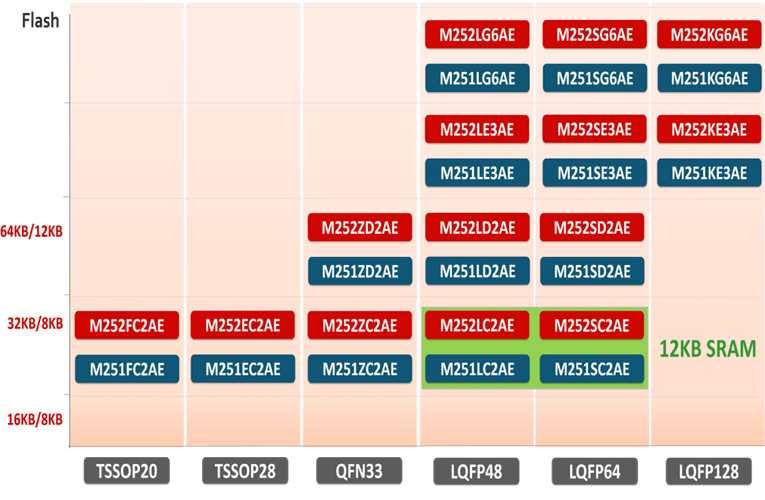
Nuvoton Technology Corporation has introduced a new low power grade NuMicroM251/M252 series of microcontrollers for industrial control applications. The new series of microcontrollers is based on Arm Cortex-M23 secure core for Armv8-M architecture running up to 48 MHz with up to 256 KB Flash and 32 KB SRAM.
The NUMicro M251/M252 series provides a wide package type from 20-pin to 128-pin and offers a wide supply voltage range from 1.8V to 5.5V and operating temperature ranges from -40℃ to 105℃. The NuMicro M251/252 provides a low power consumption of 138 μA/MHz in normal run mode, 60 μA/MHz in idle mode. The power-down mode current with RTC on is down to 2.5μA, and the Deep power-down current is less than 1.4 μA.
The NuMicro M251/M252 supports rich peripherals such as Programmable Serial I/O (PSIO), up to six pins of Voltage Adjustable Interface (VAI), External Bus Interface (EBI), Universal Serial Control Interface (USCI), QSPI, SPI/I²S, I2C, Smart Card Interface (ISO-7816-3), Watchdog timer, RTC, and up to 24 channels of PWM.
The new device can provide high performance using its integrated features such as 16-channel 12-bit 880 kSPS SAR ADC to sample the sensor data without delay, one Operational Amplifier (OPA) to amplify small signal for motor control, built-in five levels of internal voltage reference to provide precise voltage to ADC and ACMP, one 12-bit 1 MSPS voltage type DAC, and two rail-to-rail analog comparator (ACMP) to enhance product competitivity and reduce both external components and form factor.
The NuMicro M251/M252 series id designed with up to eight channels of Nuvoton Patented Programmable Series I/O(PSIO), along with the PDMA hardware. The Data in the NuMicro M251/M252 is protected by various mechanisms, including built-in one eXecute-Only-Memory (XOM) region and four Memory Protection Unit (MPU).

